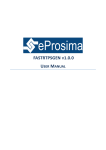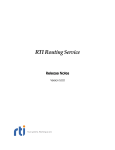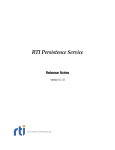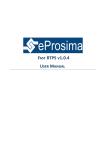Download User`s Manual - eProsima Middleware Experts
Transcript
eProsima Fast Buffers User Manual Version 0.3.0 The Middleware Experts eProsima © 2013 eProsima Proyectos y Sistemas de Mantenimiento SL Ronda del poniente 2 – 1ºG 28760 Tres Cantos Madrid Tel: + 34 91 804 34 48 [email protected] – www.eProsima.com Trademarks eProsima is a trademark of Proyectos y Sistemas de Mantenimiento SL. All other trademarks used in this document are the property of their respective owners. License eProsima Fast Buffers is licensed under the terms described in the FAST_BUFFERS_LICENSE file included in this distribution. Technical Support • Phone: +34 91 804 34 48 • Email: [email protected] Contents 1 Introduction.......................................................................................................................................4 2 Building your serialization code.........................................................................................................6 3 Defining your data types....................................................................................................................8 3.1 Basic types.................................................................................................................................8 3.2 Arrays.........................................................................................................................................8 3.3 Sequences..................................................................................................................................9 3.4 Structures...................................................................................................................................9 3.5 Unions......................................................................................................................................10 3.6 Enumerations...........................................................................................................................11 4 Common API....................................................................................................................................12 5 Integrating new source code...........................................................................................................14 6 HelloWorld example........................................................................................................................15 6.1 Writing the IDL file...................................................................................................................15 6.2 Generating specific code..........................................................................................................15 6.3 Using the common API............................................................................................................15 6.4 Building and executing.............................................................................................................16 1 Introduction eProsima Fast Buffers is a high-performance serialization library capable of translating structured data into a format that can be stored and recovered later in the same or another computer environment. You have to define your structured data once, and then you can use specific generated source code to easily serialize and deserialize it in different operating systems. To declare your structured data, you have to use IDL (Interface Definition Language) format. IDL is a specification language, made by OMG (Object Management Group), which describes an interface in a language-independent way, enabling communication between software components that do not share the same language. The main component of eProsima Fast Buffers is a tool that reads IDL files and parses a subset of the OMG IDL specification to generate serialization source code. This subset includes only the data type descriptions included in section 3 (Defining your data types). The rest of the file content is ignored. eProsima Fast Buffers has another relevant component: a C++11 library which provides different serialization mechanisms. Currently two serialization mechanisms are supported: One of them is the standard CDR (Common Data Representation) 1. CDR is a transfer syntax lowlevel representation for transfer between agents, mapping from data types defined in OMG IDL to byte streams. The other one is a modified implementation of CDR, which has an overwhelming speed-up compared to the classical approach. The reason why this implementation is faster is because it does not use some of the features of the standard CDR serialization, in order to improve performance. One of the main features of eProsima Fast Buffers is it avoids users from knowing anything about serialization or deserialization procedures. For that task, it provides a homogeneous API which supports serialization of several different data types. With this document you are about to learn how to use eProsima Fast Buffers components, improving the communications in your applications by using a fast serialization. It is structured this way: 1 • Section 1 (Introduction) presents eProsima Fast Buffers. • You begin learning how to build source code for serializing data types in section 2 (Building your serialization code). • All supported data types by eProsima Fast Buffers are listed in section 3 (Defining your data types). This section also shows how to define these data types using the IDL definition language. • Section 4 (Common API) explains the common API used by the generated source code. • In section 5 (Integrating new source code) you learn how to integrate the new source code in your application. • In section 6 (HelloWorld example) a complete HelloWorld example is shown. Visit http://www.omg.org/cgi-bin/doc?formal/02-06-51 for more information about CDR serialization standard This release of eProsima Fast Buffers only supports the generation of source code in C++11. Forthcoming releases will integrate more programming languages. 2 Building your serialization code eProsima Fast Buffers provides a Java application responsible for generating source code using the data types defined in an IDL file. This generated source code can be used in your applications in order to serialize your data types. This section guides you through the usage of this Java application and briefly describes the generated files. The Java application can be executed using the following script: In Windows: > fastbuffers.bat Note: The script will be found by Windows if its location has been set in the PATH environment variable. This can be done during the installation process. More information can be found in the Installation Manual. In Linux: $ fastbuffers.sh eProsima Fast Buffers Java application is capable of processing several IDL files. The expected argument line is: fastbuffers [<options>] <IDL file> [<IDL file> ...] where the available options are: Option Description -help Shows the help information. -version Shows the current version of eProsima Fast Buffers. -d <directory> Output directory where the generated files are created. -example <platform> Generates an example and a solution to compile the generated source code for a specific platform. The help command shows the supported platforms. -replace Replaces the generated source code files whether they exist. -ser <cdr | fastcdr> Serialization mechanism used. eProsima Fast Buffers currently supports two serialization mechanisms. CDR serialization is the default mechanism, but it also supports a Fast CDR serialization. For each processed IDL file eProsima Fast Buffers tool generates four source code files. Next diagram shows the generated source code files for a MyTypes.idl example IDL file. Next table summarizes the content of each generated file. File Description MyTypes.h C++ Header file containing the user data types mapped to C++11 programming language. MyTypes.cpp C++ Source file containing the user data types mapped to C++11 programming language. 3 Defining your data types You have to define your data types using IDL format. Not all IDL features are supported in this version of eProsima Fast Buffers. This section shows you what IDL types are supported and how eProsima Fast Buffers maps them in C++11 programming language. For each IDL file parsed by eProsima Fast Buffers two source code files are generated. They contain the C++11 mapping of your IDL types. For example, from an IDL file named Foo.idl, eProsima Fast Buffers tool generates the files Foo.h and Foo.cpp that contain the C++11 mapping of the defined IDL types. Next subsections introduce the supported IDL types. 3.1 Basic types The following table shows the basic IDL types supported by eProsima Fast Buffers and how they are mapped to C++11. IDL C++11 char vartype; char vartype; octet vartype; uint8_t vartype; short vartype; int16_t vartype; unsigned short vartype; uint16_t vartype; long vartype; int32_t vartype; unsigned long vartype; uint32_t vartype; long long vartype; int64_t vartype; unsigned long long vartype; uint64_t vartype; float vartype; float vartype; double vartype; double vartype; boolean vartype; bool vartype; string vartype; std::string vartype; 3.2 Arrays eProsima Fast Buffers supports arrays and multidimensional arrays. An array is mapped to the STD array container. The following table shows the supported array types and how they are mapped. IDL type C++11 type char arraytype[5]; std::array<char, 5> arraytype; octet arraytype[5] std::array<uint8_t, 5> arraytype; short arraytype[5] std::array<int16_t, 5> arraytype; unsigned short arraytype[5] std::array<uint16_t, 5> arraytype; long arraytype[5] std::array<int32_t, 5> arraytype; unsigned long arraytype[5] std::array<uint32_t, 5> arraytype; long long arraytype[5] std::array<int64_t, 5> arraytype; unsigned long long arraytype[5] std::array<uint64_t, 5> arraytype; float arraytype[5] std::array<float, 5> arraytype; double arraytype[5] std::array<double, 5> arraytype; 3.3 Sequences eProsima Fast Buffers supports sequences. A sequence is mapped to the STD vector container. The following table shows the supported sequence types and how they are mapped. IDL C++11 sequence<char> sequencetype; std::vector<char> sequencetype; sequence<octet> sequencetype; std::vector<uint8_t> sequencetype; sequence<short> sequencetype; std::vector<int16_t> sequencetype; sequence<unsigned short> sequencetype; std::vector<uint16_t> sequencetype; sequence<long> sequencetype; std::vector<int32_t> sequencetype; sequence<unsigned long> sequencetype; std::vector<uint32_t> sequencetype; sequence<long long> sequencetype; std::vector<int64_t> sequencetype; sequence<unsigned long long> sequencetype; std::vector<uint64_t> sequencetype; sequence<float> sequencetype; std::vector<float> sequencetype; sequence<double> sequencetype; std::vector<double> sequencetype; 3.4 Structures In IDL, a structure is defined as a set of members, each one with its own type. An IDL structure type is mapped as a C++ class, while each member is mapped as a class attribute. A set of methods to get and set the attribute is also created. The following table shows and example of an IDL structure type and its mapping to the C++11 programming language. IDL struct Structure { octet octet_value; long long_value; string string_value; }; C++11 class Structure { public: Structure(); ~Structure(); Structure(const Structure &x); Structure(Structure &&x); Structure& operator=(const Structure &x); Structure& operator=(Structure &&x); void octet_value(uint8_t _octet_value); uint8_t octet_value() const; uint8_t& octet_value(); void long_value(int64_t _long_value); int64_t long_value() const; int64_t& long_value(); void string_value(const std::string &_string_value); void string_value(std::string &&_string_value); const std::string& string_value() const; std::string& string_value(); private: uint8_t m_octet_value; int64_t m_long_value; std::string m_string_value; }; 3.5 Unions In IDL, a union is defined as a sequence of members with their own types and a discriminant that specifies which member is in use. An IDL union type is mapped as a C++ class with access functions to the union members and the discriminant. The following table shows an example of IDL union type and its mapping to the C++11 programming language. IDL union Union switch(long) { case 1: octet octet_value; case 2: long long_value; case 3: string string_value; }; C++11 class Union { public: Union(); ~Union(); Union(const Union &x); Union(Union &&x); Union& operator=(const Union &x); Union& operator=(Union &&x); void d(int32t __d); int32_t _d() const; int32_t& _d(); void octet_value(uint8_t _octet_value); uint8_t octet_value() const; uint8_t& octet_value(); void long_value( int64_t _long_value); int64_t long_value() const; int64_t& long_value(); void string_value(const std::string &_string_value); void string_value(std::string &&_string_value); const std::string& string_value() const; std::string& string_value(); private: int32_t m__d; uint8_t m_octet_value; int64_t m_long_value; std::string m_string_value; }; 3.6 Enumerations An enumeration in IDL format is a collection of identifiers that have a numeric value associated. An IDL enumeration type is mapped directly to the corresponding C++11 enumeration definition. The following table shows an example of an IDL enumeration type and its mapping to the C++11 programming language. IDL enum Enumeration { RED, GREEN, BLUE }; C++11 enum Enumeration : uint32_t { RED, GREEN, BLUE }; 4 Common API All generated data types contain the necessary functionality to be serialized or deserialized using the selected mechanism. This section shows you the API provided to serialize your data types. For more detailed information read the C++11 API Manual. eProsima FastBuffers provides two classes which implement the supported serialization mechanisms. The eprosima::fastcdr::Cdr class implements the CDR serialization and the eprosima::fastcdr::FastCdr class implements the FastCDR serialization. This section splits this API in three categories and shows examples using both serialization mechanisms. Initialization API eprosima::fastcdr::Cdr and eprosima::fastcdr::FastCdr classes need a raw buffer to read or write serialized data. This raw buffer must be previously managed by an object of the class eprosima::fastcdr::FastBuffer. Here is an example of eprosima::fastcdr::Cdr objects: the creation of both eprosima::fastcdr::FastBuffer and // Raw buffer where data is serialized. char buffer[500]; // Object that manages the raw buffer. eprosima::fastcdr::FastBuffer fastbuffer(buffer, 500); // Object that serializes the data. eprosima::fastcdr::Cdr ser(fastbuffer); An example of the creation of eprosima::fastcdr::FastBuffer and eprosima::fastcdr::FastCdr objects: // Raw buffer where data is serialized. char buffer[500]; // Object that manages the raw buffer. eprosima::fastcdr::FastBuffer fastbuffer(buffer, 500); // Object that serializes the data. eprosima::fastcdr::FastCdr ser(fastbuffer); Serialization API The eprosima::fastcdr::Cdr class offers two ways to serialize each data type: • eprosima::fastcdr::Cdr& operator<< (const type&) This operator serializes a data value of the type type. • eprosima::fastcdr::Cdr& serialize (const type&) This method serializes a data value of the type type. The eprosima::fastcdr::FastCdr class offers two ways to serialize each data type: • eprosima::fastcdr::FastCdr& operator<< (const type&) This operator serializes a data value of the type type. • eprosima::fastcdr::FastCdr& serialize (const type&) This method serializes a data value of the type type. Deserialization API The eprosima::fastcdr::Cdr class offers two ways to deserialize. • eprosima::fastcdr::Cdr& operator>> (type&) This operator deserializes a data value of the type type. • eprosima::fastcdr::Cdr& deserialize (type&) This method deserializes a data value of the type type. The eprosima::fastcdr::FastCdr class offers two ways to deserialize. • eprosima::fastcdr::FastCdr& operator>> (type&) This operator deserializes a data value of the type type. • eprosima::fastcdr::FastCdr& deserialize (type&) This method deserializes a data value of the type type. Here is an example of the serialization and deserialization of a Foo object: // Variable of the type Foo defined in Foo.idl Foo foo; // Serializing the variable with the previously created serialization object. ser << foo; // Deserializing the variable with the previously created serialization object. ser >> foo; 5 Integrating new source code In order to integrate the generated source code in your application you have to take some points into consideration. This section shows these points and how to deal with them. eProsima Fast Buffers tool provides an option to generate and compile working examples. You can obtain detailed information about integrating the generated code in your applications by using that option. Including C++11 headers To compile the generated source code in your application you must specify the location of the C+ +11 headers used by this source code. These headers are located in the eProsima Fast Buffers installation directory. In Windows: %FAST_BUFFERS%\include In Linux: they are found automatically because they were installed in /usr/include Linking against eProsima Fast Buffers library eProsima Fast Buffers contains a serialization library. This library gathers all supported serialization mechanisms. Your application must be linked against this library in order to achieve a successful compilation. This library is located in the eProsima Fast Buffers installation directory. In Windows: %FAST_BUFFERS%\lib In Linux: it is found automatically because it was installed in /usr/lib 6 HelloWorld example This section explains how to write a HelloWorld example step by step. This example has a simple structure with a string to serialize/deserialize. 6.1 Writing the IDL file The first step is to write an IDL file containing the structures you want to serialize/deserialize. In this case, it is a simple structure: struct HelloWorld { string message; }; Save this file as HelloWorld.idl. 6.2 Generating specific code Open a command prompt and go to the directory containing HelloWorld.idl. If you are running this example in Windows, execute the following line: fastbuffers -example x64Win64VS2010 HelloWorld.idl If you are running it in Linux, execute this one: fastbuffers -example x64Linux2.6gcc HelloWorld.idl Note that if you are running eProsima Fast Buffers in a 32-bit operating system you have to use -example i86Win32VS2010 or -example i86Linux2.6gcc instead. This command generates your serialization code and some project files designed to build your HelloWorld example. In Windows, it generates a Visual Studio 2010 solution, named solutionx64Win64VS2010.sln. This solution has two projects: HelloWorld, with the generated serialization code, and HelloWorldExample, with a usage example. In Linux, on the other hand, it generates a makefile. 6.3 Using the common API Edit the file HelloWorldExample.cpp. It takes a HelloWorld object (defined as a structure in your IDL file), serializes and deserializes it into another HelloWorld object. You just have to add the initialization code and a statement to print the result, like this example does: int main() { FastBuffer fastbuffer; Cdr HelloWorld_ser(fastbuffer); // Structure to serialize. HelloWorld ser_var; // The structure has to be initialized. ser_var.message("Hello World!"); // Serialization. HelloWorld_ser << ser_var; // Reset the reading position in the serializer object to start deserialization. HelloWorld_ser.reset(); // The buffer will be deserialized in the next structure. HelloWorld des_var; // Deserialization. HelloWorld_ser >> des_var; // Print the deserialized message cout << des_var.message() << endl; return 0; } Once your structure has been serialized, if you want to obtain the corresponding char* buffer you just have to invoke fastbuffer.getBuffer() method. 6.4 Building and executing To build your code using Visual Studio 2010, make sure you are in the Debug (or Release) profile, and then build it (F7). Now go to <example_dir>\bin\x64Win64VS2010 directory and execute HelloWorldExample.exe. You will get the message: Hello World! This example was created statically. To create a DLL containing the serializators and the structures, select the Debug DLL (or Release DLL) profile and build it (F7). Now, to get your .dll and .lib go to <example_dir>\objs\x64Win64VS2010 directory. You can now run the same application dynamically using the .exe file generated in <example_dir>\bin\x64Win64VS2010, but first you have to make sure your .dll location directory is appended to the PATH environment variable. To build your code in Linux use this command: make -f makefile_x64Linux2.6gcc Now go to <example_dir>\bin\x64Linux2.6gcc directory and execute HelloWorld. In both scenarios you will get this message when you run the binary file: Hello World!































